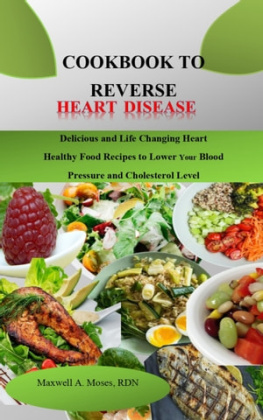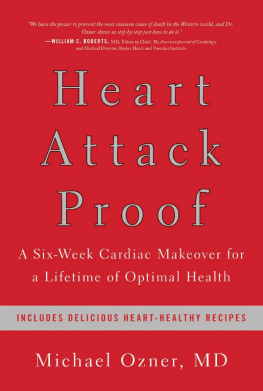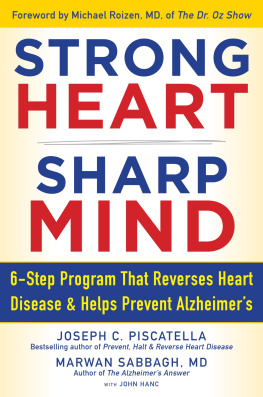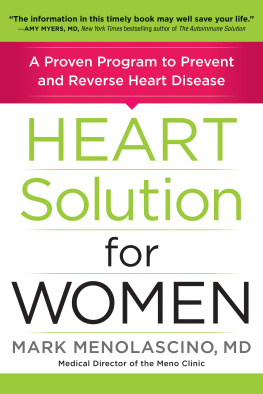Additional Praise for Prevent, Halt & Reverse Heart Disease
I was skeptical: Why one more cardiac self-help book? But then I started readingtill the very end. I could not put it down: well-written, little med-speak and entirely up-to-date and accurate. This is something I can recommend to all my patients.
V.F. FROELICHER, M.D.,
Professor of Medicine, Stanford University
Whether youre trying to prevent that first heart attack or reduce your risk of a second one, this is the book to read. It tells you what you need to know about exercise, nutrition and handling stressall in terms you can understand and apply in your daily life.
REDFORD WILLIAMS, M.D.,
Director, Behavioral Medicine, Duke University Medical Center
Joe Piscatella and Dr. Barry Franklin have made an important contribution to the heart health of the nation. This eminently readable book combines medical information and suggestions for self-help.
NANETTE K. WENGER, M.D.,
Professor of Medicine (Cardiology), Emory University School of Medicine
Prevent, Halt & Reverse Heart Disease is superban outstanding book by two of the foremost experts on lifestyle modification and heart disease prevention. It is must reading for anyone who wants to prevent a heart attack or avoid another if they have already had one.
NEIL F. GORDON, M.D., PH.D., M.P.H.,
Chief Medical and Science Officer, Nationwide Better Health
A must-read for anyone who wants a science-based, comprehensive and sensible approach for reducing their risk of heart disease. It offers the gold-standard dietary recommendations, as well as the new discoveries in nutrition to promote health, all in how-to examples that readers will value.
PENNY KRIS-ETHERTON, PH.D., R.D.,
Distinguished Professor of Nutrition, Penn State University
This easy-to-read book takes the mystery out of heart disease and translates the latest science into a remarkable how-to manual of prevention. Reliable, current and practical advice for anyone who has a beating heart!
GARY J. BALADY, M.D.,
Director of Preventive Cardiology, Boston Medical Center,
Boston University School of Medicine
A comprehensive guide for anyone concerned about heart disease. Its filled with practical advice and cutting-edge information. Read it today!
WAYNE M. SOTILE, PH.D.,
Director of Psychological Services,
Wake Forest University Healthy Exercise and Lifestyle Programs
A sensible, clear and comprehensive approach to improving heart health. It highlights the latest findings in cardiovascular research and provides useful tools for putting our current prevention and treatment guidelines into practice.
RONALD M. KRAUSS, M.D.,
Childrens Hospital Senior Scientist, Oakland Research Institute
A well-written treasure trove of information. Utilized properly, this book can add a significant dimension to our overall educational effort to positively influence and improve the cardiovascular health of our society.
GERALD F. FLETCHER, M.D.,
Mayo Clinic Jacksonville
This is an excellent, easily readable book, which is loaded with information and should be of great value to all who want to take the best possible steps to prevent heart disease.
SIDNEY C. SMITH JR., M.D.,
Professor of Medicine, Director, Center for Cardiovascular Science and Medicine,
University of North Carolina School of Medicine
Take a short cut to a long life with a few hours of entertaining reading.
GERALD C. TIMMIS, M.D.,
Medical Director Emeritus, Clinical Research, William Beaumont Hospital
109 Things You Can Do
Prevent, Halt & Reverse Heart Disease

BY JOSEPH C. PISCATELLA & BARRY A. FRANKLIN, Ph.D.
WORKMAN PUBLISHING NEW YORK
The material in this book is provided for information only and should not be construed as medical advice or instruction. Always consult with your physician or other appropriate health professionals before making any changes in diet, physical activity and/or drug therapy.
Copyright 2003, 2011, 2015 by Joseph C. Piscatella and Barry A. Franklin, Ph.D.
Updated for medical accuracy in 2018.
All rights reserved. No portion of this book may be reproducedmechanically, electronically, or by any other means, including photocopyingwithout written permission of the publisher. Published simultaneously in Canada by Thomas Allen & Son Limited.
eISBN 9780761164050
Originally published as Take a Load Off Your Heart, now revised and updated
Cover illustration by Eric Palma
Workman Publishing Co., Inc.
225 Varick Street
New York, NY 10014-4381
www.workman.com
To my wife, Bernie, my most constructive critic, ardent supporter and best friend. The journey with her has been a gift from God.
J.C.P.
To Lynn Strong, lover of books, editor extraordinaire, friend.
Her fingerprints are all over this book.
J.C.P.
To my wife, Linda, for her love, patience, understanding, encouragement and support.
She has helped, in so many ways, to turn my dreams into reality.
B.A.F.
Acknowledgments
It takes a team of dedicated people to put a book together. In particular, we are grateful to the medical professionals who gave of their time and expertise, providing information and insight and offering valuable suggestions. These include William C. Roberts, M.D., and Beverly Utt, R.D., M.P.H.
The book would not be possible without our respective staff support, particularly Brenda White at William Beaumont Hospital and Sue Tomaszycki, who helped with the graphics.
And finally, the dedication and expertise at Workman Publishing have been instrumental. Our thanks to Peter Workman for his faith in our work, to Susan Bolotin and Lynn Strong for their masterful editorial touch, and to the entire Workman teamespecially Jenny Mandel, Selina Meere, Beth Wareham, Walter Weintz, Page Edmunds, David Matt, Janet Vicario and Yin Ling Wongfor their dedicated support.
Contents
STEP 1
Assess Your Risk
STEP 2
Manage Daily Stress
STEP 3
Make Exercise a Habit
STEP 4
Balance Your
Before We Start
We know from our own experience that when questions of health are pressing, many of us want quick answers even before we know exactly what to ask. Since the two of us have counseled literally thousands of patients, weve gotten pretty good at guessing whats on peoples minds. We hope youll find the answers youre looking for on these pages.
What does a heart attack feel like?
Everyonenot just cardiac patientsneeds to know the answer to this one. Among the most common heart attack symptoms are pain, pressure or a sense of fullness under the breastbone that lasts two minutes or more.
Men often say the pain feels like having an elephant on my chest; women typically experience a milder chest pain. The sensation may radiate to the shoulders, neck, jaw, back or arms. (Or it may not.) Women generally experience the radiating pain throughout the neck, jaw, shoulders, arms, back or abdomen; in general, their symptoms are more subtle. Men tend to have sharp pain in their arms and shoulders. Dizziness, sweating, nausea, heart rhythm irregularities and shortness of breath may also occur. Nevertheless, some heart attacks are silent and occur with few or no symptoms.
Should I call 911 even if I dont have all these symptoms?
Next page





